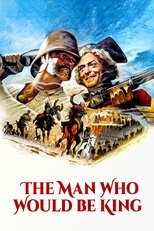John Chard
Aug 28, 2014
9/10
From the upper echelon of boys own adventures comes - The Man Who Would Be King!
Two ex-servicemen are lolling around colonial India, it's just the start of a journey that will see them in Kafiristan. Here the mountain dwellers believe the rouge white fellows to be Gods, and thus things are about to get very interesting indeed.
Written by master writer Rudyard Kipling, directed by behemoth John Huston and starring British legends Sean Connery & Michael Caine, there really isn't any way this film could have failed - sure enough the picture exudes a classy structure that is coupled with deftly smart writing. The Man Who Would Be King was a project that John Huston had coveted for many a year (decade), as far back as the 40s he was looking to adapt the Kipling short with Humphrey Bogart & Clark Gable in the leads. Some time after it was mooted that he fancied Peter O'Toole & Richard Burton to play Messrs Dravot & Carnehan. Fast forward to 1975 and the eventual pairing of Caine & Connery now looks like a masterstroke of casting, and it really is impossible to imagine anyone else in the roles of the amoral scavenger duo of the piece. in short, the wait for the film was indeed worth it.
That the film is known as an adventure genre staple is a given, but it should be noted that in amongst the delightful fusion of fantasy and swashbuckling values, there lies wonderful characterisation, cheeky sly glances at the power crazy, imperialism, greed, and it pulses a political beat. A highly entertaining picture that stands up really well ever more today in this new millennium age. I mean it's got Caine & Connery playing rapscallions for Gods sake! Enough said there me thinks! 8/10
